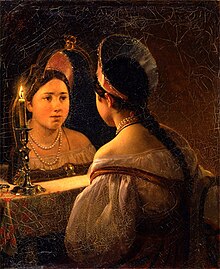| This article needs additional citations for verification. Please help improve this article by adding citations to reliable sources. Unsourced material may be challenged and removed. Find sources: "Svetlana" ballad – news · newspapers · books · scholar · JSTOR (July 2021) (Learn how and when to remove this message) |
 Karl Bryullov, 'Guessing Svetlana' Karl Bryullov, 'Guessing Svetlana' | |
| Author | Vasily Zhukovsky |
|---|---|
| Original title | Светлана |
| Language | Russian |
| Genre | Ballad |
| Published | 1813 |
| Publisher | Bulletin of Europe |
Svetlana is a Russian ballad written by Vasily Zhukovsky and published in 1813. It is often credited with popularizing the given name Svetlana, which is also the name of the protagonist.
Creation and publication history

First published in the journal Vestnik Evropy, 1813, No. 1 and 2, with the subtitle: "To Al. An. Pr...va. " Dedicated to Zhukovsky's niece and student Aleksandra Andreevna Voeikova (who was the sister of the poet's muse M.A.Protasova-Moyer ), as a wedding gift to her.
The beginning of work on "Svetlana" dates back to 1808, the text was completed in 1812. In the well-known two-volume edition, as well as in the collection of selected works (all edited by A. D. Alferov), the edition of the Association of I. D. Sytin (Moscow, 1902), the ballad is attributed to the works of 1811.
The plot is based on Gottfried Bürger's ballad " Lenora". Zhukovsky addressed this plot three times: before Svetlana, he transcribed Lenora in the ballad Lyudmila, and later, in 1831, translated it more accurately under the author's title - but here the abduction of the bride by the dead is presented as a bad dream of a girl, and ballad has a happy ending.
Artistic originality
"Svetlana" consists of 20 stanzas of alternating trochaic trimeter (feminine rhymes) and trochaic tetrameter (masculine rhymes). Each stanza has 14 lines with the rhyme scheme AbAbCdCdEEfGGf (masculine capitalized, feminine lowercase) and thus somewhat resembles a sonnet.
The poem is one of the most popular works of Russian romanticism and helped popularize the given name Svetlana, which had been coined by Aleksandr Vostokov in 1802.
"Svetlana" is mentioned and quoted several times by Alexander Pushkin ("Eugene Onegin", chapter 3, stanza V; chapter 5, stanza X, epigraph to chapter 5; epigraph to the story " Snowstorm "). In his commentary on Eugene Onegin (Ch. III, V, 2-4), Vladimir Nabokov assesses the ballad as a "masterpiece" and suggests that Pushkin's "Onegin stanza" arose under the influence of this unusual sonnet stanza in Zhukovsky.
References
- "В. А. Жуковский. Светлана. Текст произведения". ilibrary.ru. Retrieved 2021-07-12.
- Pushkin, Alexander (1825). Eugene Onegin.